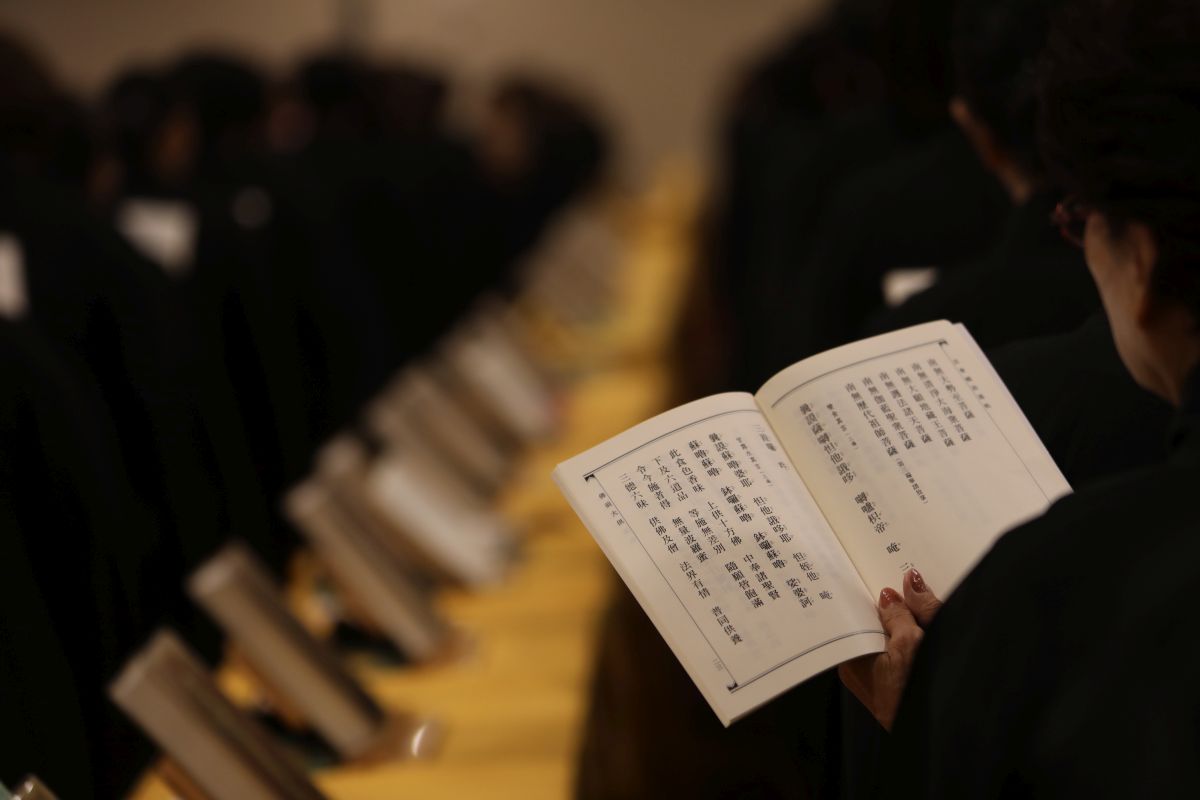Special Topics
Cultivation for Lay Buddhist Practitioners
As lay practitioners, how do we go about engaging in Buddhist practices? In modern society, we never seem to have enough time, so how do we better manage our time to engage in practice? Through a series of Q&As, let us find out how laypeople can practice Buddhism in daily life. Q: How do lay practitioners keep the precepts?
Q: How do lay practitioners keep the precepts?The content of Buddhist precepts is intended to encourage the practitioner to not only abstain from all evil, but also to proactively engage in acts of benevolence. "The giving up of all evil, the practice of good, the purification of one's mind—this is the instruction of Buddhas." This is known as the Verse of the Shared Morality of the Seven Buddhas, which clearly states the essential spirit of keeping the precepts, including the Five Precepts, the Eight Precepts, the Ten Precepts, the Bhikshu Precepts, the Bhikshuni Precepts, and Bodhisattva Precepts.
There are four categories of precepts for lay practitioners to keep: the Three Refuges, the Five Precepts, the Eight Precepts, and the Bodhisattva Precepts, the former two of which are fundamental. Believing in and adopting outer-path practices instead of upholding the Three Refuges and the Five Precepts, indicates that one does not believe in Buddhism and thus, is not a Buddhist. Therefore, we are required to recite the Three Refuge Vows during our daily morning and evening practices, to remind ourselves to always return to the Buddha, the Dharma, and the Sangha. To uphold the Five Precepts and Ten Virtues is to purify our bodily, verbal and mental actions. The Five Precepts and Ten Virtues constitute the fundamental principles of being human. Apart from helping one refrain from committing faults and doing evil, they actually protect the physical and mental well-being of a lay practitioner, thus allowing them to cultivate their practice with a peaceful mind. We should practice the Five Precepts and Ten Virtues to eliminate the Three Poisons of craving, aversion, and ignorance.
Upholding the Eight Precepts is the entry point to the path toward liberation from the cycle of birth and death. On the other hand, the Bodhisattva Precepts is a method of benefitting both self and others, as well as a way to universally deliver all sentient beings. Only by keeping the precepts in a pure manner can our body and mind calmly abide in the Dharma, and thus cultivate concentration and develop in wisdom. Therefore, after receiving the precepts, lay practitioners should regard upholding the precepts as spiritual provisions needed for their practice.
Q: How do lay Buddhists practice concentration?
In Buddhism, the cultivation of concentration focuses on enabling our mind to be unaffected by both the external environment and our internal mental states. To allow ourselves to be influenced by internal or external influences and thus generate an afflicted emotion is to have a disturbed mind, not a concentrated one. So lay Buddhists should practice Chan and cultivate concentration, to help themselves maintain a clear and bright mind, without letting outside circumstances determine their state of mind.
Sitting meditation is the first step to practicing Chan. For beginners, after learning Chan teachings, it is best to practice sitting meditation at a set time every day and apply it consistently in their daily life. Whether seated on a cushion, in traffic, or at work, we should remain calm, stable, and at ease.
When practicing sitting meditation at home, find a clean and peaceful place, and start with a warm-up stretching exercise. You can choose to sit in full-lotus, half-lotus, or simply sit cross-legged, as long as you feel comfortable and stable. Keep the spine upright, shoulders relaxed, tip of tongue touching the upper palate, and eyes 80% closed, and then proceed to count the breaths or apply other meditation methods.
By developing the custom of practicing sitting meditation every day, lay practitioners will be able to find peace of mind, develop in wisdom, and leave their worries behind. Thus, practicing meditation not only enables us to calm our minds, but also forms an important foundation in cultivating wisdom.
Q: How do lay practitioners cultivate wisdom?
The Buddha is the consummation of wisdom and compassion, as wisdom eliminates troubles and compassion helps deliver all sentient beings. The ultimate state of wisdom is the enlightened realization of the impermanence of all dharmas, the empty, selfless nature of all conditioned phenomena, and the state of liberation that emerges from the insight of no-self.
To eliminate troubles, a lay practitioner requires the Three Wisdoms: namely, listening, contemplation and practice. Wisdom of listening is acquired through hearing the teachings of the Dharma; wisdom of contemplation is attained through reflecting on the Buddha's teachings; and wisdom of practice comes from continually applying oneself to the Threefold Training of precepts, Samadhi (concentration) and wisdom.
With the wisdom developed by hearing the Dharma and studying Buddhist sutras, one can establish the right views, thus firmly believing in the law of causality and the principle of causes and conditions. On the other hand, through the wisdom of contemplation, we are able to reflect on the suffering of human life, that all phenomena arise due to their causes and conditions, and that all dharmas are impermanent. This leads us to let go of our mental attachments and leave our erroneous views behind. With the wisdom developed through practice, we will be mindful of our bodily, verbal and mental actions, and refrain from doing harm, speaking hurtful words, and harboring malicious thoughts to others. That is, we will do our best to benefit sentient beings, and thereby develop the wisdom of no-self.
Enlightenment does not happen overnight, and the most reliable way of practice for lay Buddhists is to practice diligently. We can start by listening to Dharma talks and reading the sutras, and then go further by keeping the precepts and engaging in meditation practice, to develop wisdom. Honing the skills of our practice of the precepts, concentration, and wisdom helps fulfill our aspiration to attain Buddhahood.
 Q: How do we practice if we are too busy to have time for practice?
Q: How do we practice if we are too busy to have time for practice?Living in our hectic modern society, if we can make the best use of bits of our spare time and apply the methods whenever or wherever possible, then we will also benefit from the practice. Actually, many spare moments of our free time in our life can be just as useful for reciting the dharani or the Buddha’s name, for they have the same effect of calming our minds. In doing so, not only can we rein in our chaotic state of mind, but we can even feel the presence of the Buddha or bodhisattva being with us at all times and thus enjoy peace of mind.
On the other hand, we can also carry Buddhist literature with us to read in our free time, or listen to online Buddhist sutra seminars and Buddhadharma lessons for good practice. The main objective is to use it as a reminder for us to maintain the right views and correct knowledge at all times, so as not to lose ourselves in the earthly values of this world, drift with the tide, and deviate from the path to Buddhahood.
The practice of Buddhism is none other than the cultivation of our mind. Regardless of the method we use, be it reciting the Buddha's name or sitting in meditation, Buddhist practice helps regulate our minds. Hence, the most important attitude to life is that of living in the present, i.e. not dwelling on the past or fantasizing about the future. So, the simplest and most reliable application of Chan in our daily life is in tasting every mouthful of food when dining, concentrating on every task at work, and facing each day with equanimity.
Q: Should lay Buddhists do more of voluntary work or meditation practice?
Doing voluntary work is also a form of Buddhist practice. Many people have the misconception that Buddhist practice is only about sitting in meditation, reciting the Buddha's name, and doing repentance prostrations. Actually, working as a volunteer by giving our time and effort is also an important practice. Mahayana Buddhism especially values arousing the Bodhi-mind to benefit sentient beings, which begins with the practice of giving as the entry to the bodhisattva path. Furthermore, volunteering is in fact a form of giving.
In what way does volunteering help us cultivate merits? By protecting and supporting the Three Gems and Dharma practice places, we facilitate other people’s practice and benefit people, thereby increasing our merits. And, in what way does volunteering help us cultivate wisdom? Doing voluntary work, we are not seeking fame or fortune, but are simply committed to the work itself. This enables us to eliminate our self-attachment and egoistic affliction, thus gaining in wisdom. Therefore, any form of voluntary work can be a practice that helps us cultivate both merit and wisdom.
Extended Reading:
Characteristics of a True Buddhist Lay Practitioner
Resource: Issue 435 of Life Magazine, Dharma Drum Publishing Corporation
Translation: Cheng-Yu Chang (張振郁)
Editing: Chia-cheng Chang (張家誠), Keith Brown
Photos: Ssu-hsien Chiang (江思賢)
